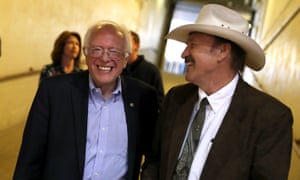 |
| Janie Osborne/Getty Images |
WASHINGTON POST
A troubling victory for Republicans in Montana. Gianforte’s victory after assaulting reporter reflects rising tribalism in American politics.
Greg Gianforte admitted to attacking a reporter and apologized during his victory speech last night, as he kept Montana’s sole House seat in Republican hands.
On the eve of the special election, the
wealthy technology entrepreneur flipped out when the Guardian’s Ben Jacobs asked him about the CBO’s score of the health care bill. He now faces misdemeanor assault charges for reportedly throwing Jacobs to the ground and breaking his glasses.
“I made a mistake,” the congressman-elect said at his party in Bozeman. “Not in our minds!” yelled a supporter. David Weigel, who was there, reports that
some in the crowd laughed.
-- After his ... six-point victory, Republican congressional leaders are making clear there will be no meaningful consequences for his behavior.
-----
Many rank-and-file Republican voters, who follow the cues and signals of their leaders, defended their nominee’s behavior. “I understand the frustration of someone being right in your face,” Luanne Biggs, who voted for Gianforte, told
the Bozeman Daily Chronicle. “I feel like it’s a little set up.”
CNN correspondent Kyung Lah went to a polling place to interview voters and reported that nearly everyone she talked with said they weren’t changing their vote.
----
The Montana NBC Affiliate reportedly refused to cover the Gianforte story at all on Wednesday night, a shocking blackout. Irate sources inside 30 Rock appear to have called up
New York Magazine’s Yashar Ali to complain: “KECI news director Julie Weindel was called by NBC News to see if KECI would cover the story or had any footage of the Gianforte incident that NBC News and its affiliates could use. …
She was unyielding in her refusal to share any footage she may have had access to, or run a report on the story. … Weindel said ... ‘The person that tweeted [Jacobs] and was allegedly body slammed is a reporter for a politically biased publication.’
The station was acquired, last month, by the conservative media conglomerate Sinclair Broadcasting.”
 |
| Sinclair Broadcast Group, one of the nation's largest local TV station operators, will pay about $3.9 billion for Tribune Media, adding more than 40 stations including KTLA in Los Angeles, WPIX in New York and WGN in Chicago. (Steve Ruark/AP) |
-- Here’s why that’s a big deal: Sinclair Broadcasting just struck a deal with Tribune Media to buy dozens of local TV stations. “Already, Sinclair is the largest owner of local TV stations in the nation. If the $3.9 billion deal gets regulatory approval, Sinclair would have 7 of every 10 Americans in its potential audience,”
Margaret Sullivan explained in a column last weekend. “Sinclair would have 215 stations, including ones in big markets such as Los Angeles, New York City [WPIX] and Chicago, instead of the 173 it has now. There’s no reason to think that the FCC’s new chairman, Ajit Pai, will stand in the way. Already, his commission has reinstated a regulatory loophole — closed under his predecessor, Tom Wheeler — that allows a single corporation to own more stations than the current 39 percent nationwide cap…
 |
| Ajit Pai, chairman of the U.S Federal Communications Commission, (Eric Gaillard/Reuters) |
“When Sinclair bought Washington’s WJLA-TV in 2014, the new owners quickly moved the station to the right … It added conservative commentary pieces from a Sinclair executive, Mark Hyman, and public affairs programming with conservative hosts.
(The deal would give Sinclair a second Washington station, WDCW.) And Sinclair regularly sends ‘must-run’ segments to its stations across the country. One example: an opinion piece by a Sinclair executive that echoed President Trump’s slam at the national news media and what he calls the ‘fake news’ they produce…
“During the presidential campaign, Trump’s message came through loud and clear on Sinclair’s stations, many of which are in small or medium-sized markets in battleground states such as Wisconsin, Ohio and Pennsylvania. Jared Kushner, the president’s son-in-law, even bragged,
according to Politico, that the campaign cut a deal with the media conglomerate for uninterrupted coverage of some Trump appearances. Is there a link between such content — and the expectation of more — and the loosening of federal rules?”
The darker forces that propelled President Trump’s rise are beginning to frame and define the rest of the Republican Party,” Karen Tumulty and Robert Costa explain. “When Gianforte assaulted a reporter … many saw not an isolated outburst by an individual, but the obvious, violent result of Trump’s charge that journalists are ‘the enemy of the people.’ …
 |
| Rob Quist, the folk-singing political neophyte who [ran] against Greg Gianforte, with Bernie Sanders. Photograph: Justin Sullivan/Getty Images |
- This isn’t much of a victory, though. Gianforte only won by 6 to 7 points — in a state that President Donald Trump had won by 20 points. [CNN / Lauren Fox]...This is yet another special election in which results were much tighter than they were just a few months prior during the presidential election.
- By some estimates, the recent special elections suggest Democrats have a 14-point advantage in the current political climate. That’s more than they had in 2006 and 2008, when they swept the House and Senate races. [Twitter / Nate Silver]
- Even before Gianforte attacked a reporter, there were signs the election was getting closer. So Republicans can’t just blame the close race on the altercation. [The Guardian / Ben Jacobs]














